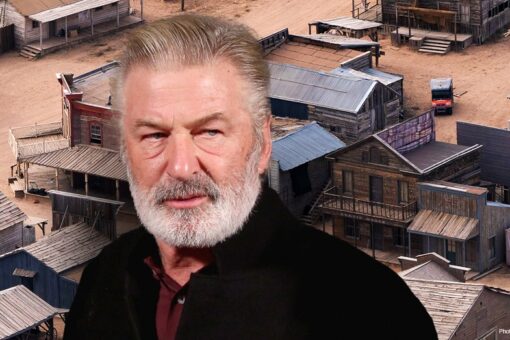As Hollywood mourns the tragic death of Halyna Hutchins, a key question remains: how did live ammunition wound up in a real gun being used as a movie prop?
On Oct. 21, the 42-year-old was accidentally shot by Alec Baldwin with a loaded weapon that was handed to the actor by an assistant director who mistakenly believed it was safe to use on the New Mexico set of “Rust.” Responders flew the 42-year-old in a helicopter to a hospital where she was pronounced dead. Director Joel Souza was also hit and injured but has since been released from the hospital.
On Wednesday, Santa Fe County Sheriff Adan Mendoza said in a press conference that a lead projectile that was taken from Souza’s shoulder came from the F.LLI Pietta Long Colt .45 caliber revolver that Baldwin, 63, fired during a dress rehearsal for the Western at the Bonanza Creek Ranch studio. The weapon in question is described as a black revolver manufactured by an Italian company that specializes in 19th-century reproductions.
Alec Baldwin is an actor and producer on the Western film ‘Rust’.
(Jim Spellman/Getty Images)
“When you’re using period guns from the Western era of the U.S., they don’t require any modification at all to fire a blank,” weapons armorer Bryan W. Carpenter told Fox News. “The guns from the 1800s are all mechanically operated. Meaning you have to do something each time to make the cylinder rotate and the gun fire. In the case of Alec Baldwin’s gun that he used on this set… you would have to physically cock the hammer back with your thumb each time you wanted it to fire and then pull the trigger. Then cock the hammer back and then pull the trigger each time. It’s done manually.”
Carpenter is the founder and president of New Orleans-based Dark Thirty Film Services, LLC, which has been involved with several high-profile projects over the years, including “The Expendables,” “Bad Country,” “NCIS: New Orleans,” “Queen of the South” and “22 Jump Street,” among others. Carpenter shared he has worked with the weapon in question, as well as others from the time period, extensively.
“Imagine Wyatt Earp, Billy the Kid, Pat Garrett and all those characters from back in the Old West and the guns they would’ve carried,” he explained. “This type of gun, they’re commonly referred to a Peacemaker. Back in the 1800s, Colt Firearm Company was one of the first to make the gun and the name was the Colt Peacemaker. They are a simple, six-shot, mechanically operated weapon. The mechanics of it is called a single action, which means you have to manually cock the hammer each time you want to fire the gun.”
Halyna Hutchins is survived by her husband and their son.
(Photo by Fred Hayes/Getty Images for SAGindie)
“Because they’re from that era and they require manual operation to function, you don’t have to have any modifications to the gun,” Carpenter shared. “Now they said that one of those guns on the table that they recovered may have been the same gun modified. My best guess is they just had one that was a true replica, like a prop gun, one made out of metal, and one made out of all plastic.”
Mendoza said there was “some complacency” in how weapons were handled on the set. Investigators found 500 rounds of ammunition – a mix of blanks, dummy rounds and what appeared to be live rounds, even though the set’s firearms specialist, armorer Hannah Gutierrez Reed, said there should never have been real ammo present.
CLICK HERE TO SIGN UP FOR THE ENTERTAINMENT NEWSLETTER
Carpenter, who was stunned that live rounds would ever be mixed in with blanks and dummy rounds, wondered why there weren’t sufficient safety checks before the firearm was ever handed to Baldwin.
Director Joel Souza has since been released from the hospital.
(Jim Spellman/Getty Images)
“If you have a cart that’s open, someone from the props department and/or the armorer has to do what we call a fire watch,” he said. “Their responsibility is to watch those guns. If the armorer has to step out to use the restroom, for example, their job is to lock up the cart, get the prop master or a responsible party to stand right with those weapons and watch them. No one is allowed to touch them for any reason.”
“And I cannot stress enough the importance of safety checks,” he continued. “There should never be a thought that there’s a live round in there. When you’re checking for blank rounds, you’re always looking for the possibility of anything else being there. You lock the weapons in the safe when they’re not in use and they must stay there. Those guns cannot be used for anything else. Everything is separated. Every time that lock is open, you check and check again. And at a minimum, two people should be present to verify that the weapon is in the condition that you say it is.”
At 24, Reed had little experience working as an armorer. She told detectives that on the morning of the shooting, she checked the dummy bullets — bullets that appear real, save for a small hole in the side of the casing that identifies them as inoperable — to ensure none were “hot,” according to a search warrant affidavit made public Wednesday.
CLICK HERE TO GET THE FOX NEWS APP
The shooting occurred on Bonanza Creek Ranch, a sprawling property that bills itself as “where the Old West comes alive.” More than 130 movies have been filmed there.
(VIA REUTERS)
When the crew broke for lunch, the guns used for filming were locked in a safe inside a large white truck where props were kept, she said. The ammunition, however, was left unsecured on a cart. There was additional ammo inside the prop truck. After lunch, the film’s prop master, Sarah Zachry, removed the guns from the safe and handed them to Reed, she told investigators.
A search warrant affidavit released last Friday revealed that Reed set three guns on a cart outside the church used for filming. Assistant director Dave Halls then took one from the cart and handed it to Baldwin. The document released Wednesday said the armorer sometimes handed the gun to Baldwin, and sometimes to Halls.
Halls told detectives he would examine the barrel for obstructions and have Reed open the hatch and spin the drum where the bullets go, confirming none of the rounds are live. This time, Halls reported, he could only remember seeing three of the rounds, and he didn’t remember if the armorer had spun the drum. Nevertheless, he yelled out “cold gun,” indicating it was safe to use. It’s unclear whether Baldwin deliberately pulled the trigger during rehearsal or if the gun went off inadvertently.
The Bonanza Creek Film Ranch in Santa Fe, N.M., is shown Friday, Oct. 22, 2021.
(AP Photo/Andres Leighton)
“[Halls] should have never handed the weapon off in the first place,” said Carpenter. “I’m sure it was done out of speed. I’m sure they were, ‘Hey, we’re ready to start. Let’s do this rehearsal.’ But where was the armorer? Why didn’t she hand it off? Why did he pick it up and hand it off instead? And then, he admitted to not checking them thoroughly. I’m in awe. Those are all negligent acts right there.”
The Associated Press contributed to this report.




